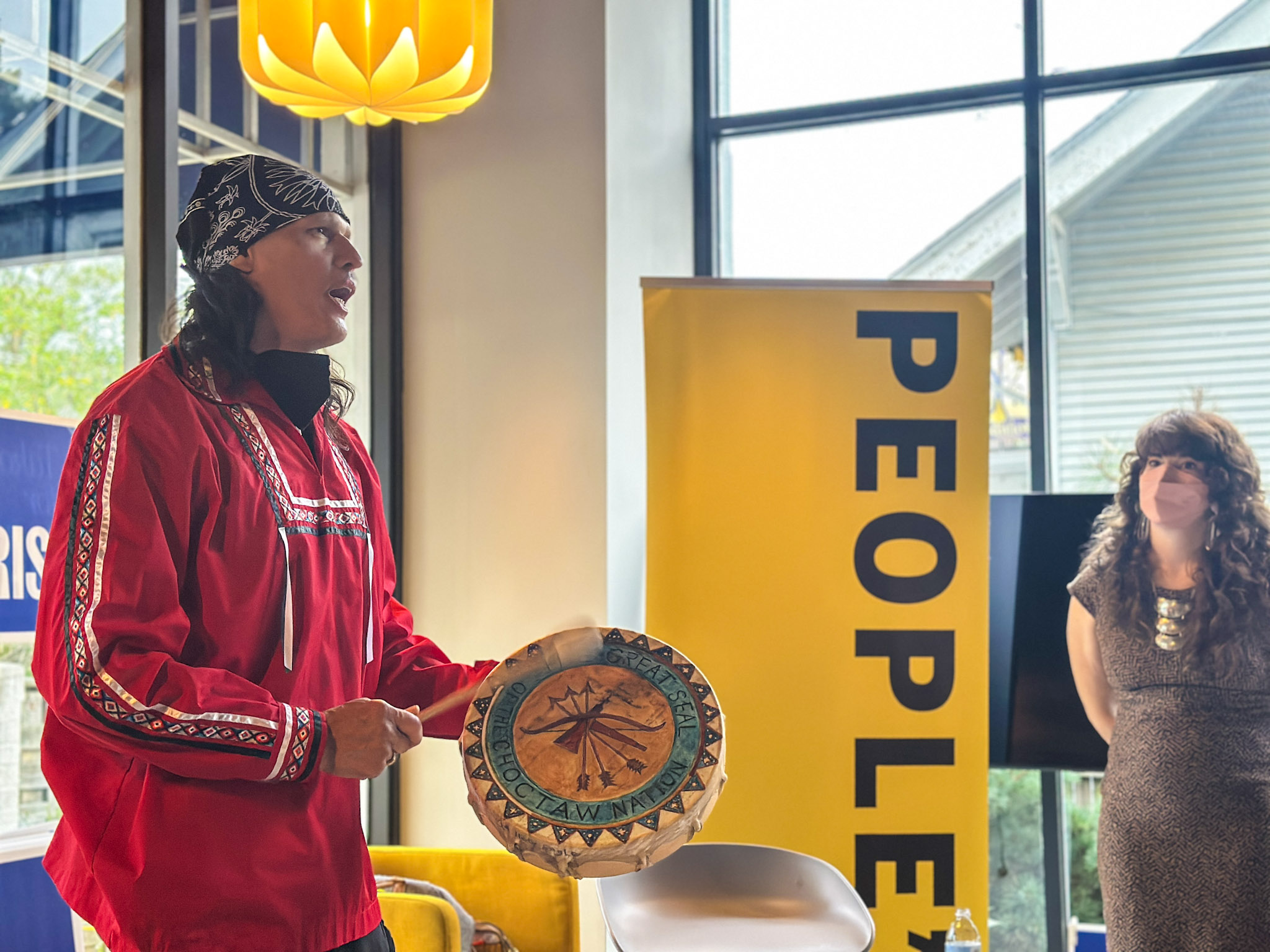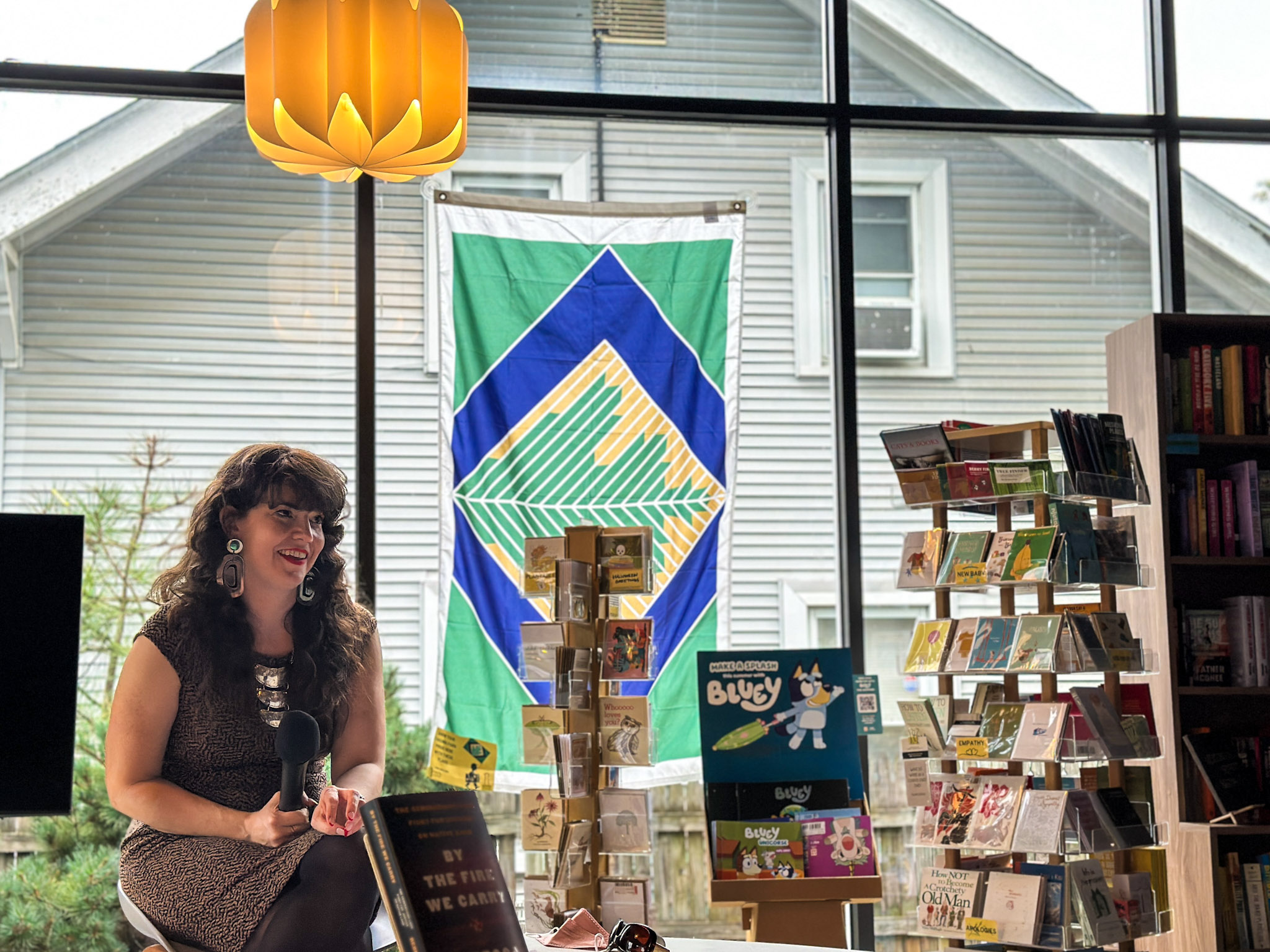Indianz.Com > News > From the Trail of Tears to a temper tantrum, Native author explores long fight for justice on tribal lands
From the Trail of Tears to a temper tantrum, Native author explores long fight for justice on tribal lands
Tuesday, October 8, 2024
Indianz.Com
“Most often, when states or non-Native people want something that belongs to a tribe, whether it’s gold, oil, land, or power, they get it — even when the law clearly protects the tribe.” — Rebecca Nagle in By the Fire We Carry: The Generations-Long Fight for Justice on Native Land, 2024.
The nation’s highest court is once again back in session with no Indian law cases currently on the docket.
But more than four years after one of the most monumental U.S. Supreme Court decisions in history, an award-winning Native journalist is taking a broad look at the historic McGirt case that led to the reaffirmation of tribal homelands in Oklahoma. In her debut book, By the Fire We Carry: The Generations-Long Fight for Justice on Native Land, author Rebecca Nagle notes that the landmark victory was more than a century in the making.
“As tribal citizens, we’re so used to that loss and we’re so used to things not going our way,” Nagle, a citizen of the Cherokee Nation, said at a well-attended reading of her book outside of Washington, D.C., last month.
“People felt all of that at the same time that they felt the victory,” Nagle said of the centuries of genocidal policies, including broken treaties, forced removal and allotment of tribal lands, that preceded the July 2020 ruling.
“For me, that history was why the case mattered,” Nagle continued at the September 16 reading in Takoma Park, Maryland. “And I think that’s why I really wanted to write the book the way that I do.”
Yet as the title of Nagle’s book indicates, the generations-long fight for justice is far from over. Despite the Muscogee (Creek) Nation securing a ruling that has confirmed the continued existence of at least nine tribal reservations, the state of Oklahoma has spent the last four years trying to undermine, weaken and even reverse the decision.
“Oklahoma had a little bit of a temper tantrum, and got really upset,” Nagle said to laughter at the reading.
More specifically, one person in Oklahoma seems to have gotten really upset. And it’s someone pretty powerful — Kevin Stitt, the Republican governor who has exploited every avenue possible, from the court of law to the court of public opinion, in hopes of overturning McGirt. “Call me crazy, but that is weird. That is super weird. That’s un-American,” Stitt said at one of his press conferences at the Oklahoma State Capitol when talking about the legal and political landscape after McGirt. “You can’t punish someone differently because of their race,” Stitt said on May 24, rehashing a faulty legal argument that he has consistently lost when he has gone to court. “And that’s exactly what’s happening in Oklahoma, in eastern Oklahoma, because of the McGirt ruling.” But as Nagle points out in her book, Native people being on the right side of the law doesn’t always mean much. The power imbalance helps explain why Stitt, despite being a citizen of the Cherokee Nation, is taking his temper tantrum into a new arena by trying to force his own tribe into accepting a motor vehicle agreement without its consent. “Our compact is the only tribal vehicle tag compact in the state that puts the tribe — not the state — in charge of issuing tags and titles to our citizens,” Cherokee Nation Principal Chief Chuck Hoskin Jr. said of a government-to-government agreement that is due to expire at the end of the year. “Governor Stitt can’t stand it,” Hoskin said in a video message on September 24.Call me crazy, but the rules shouldn’t change based on someone’s race.
— Governor Kevin Stitt (@GovStitt) June 11, 2024
That’s what Oklahoma looks like under the McGirt ruling. pic.twitter.com/yR5ZZAplJK


During the October 2023 term that concluded this June, the justices heard just one Indian law case. The outcome in Becerra v. San Carlos Apache Tribe and Becerra v. Northern Arapaho Tribe resulted in a victory for Indian Country on an issue that has gone before the Supreme Court multiple times over the last two decades. Despite winning repeatedly on funding for their self-determination contracts and self-governance compacts, tribes have had to battle to hold the U.S. accountable for its promises. The court’s current term began on Monday but the justices have not added any Indian law cases to their workload. Petitions are pending in Apache Stronghold v. United States, a high-profile dispute over Oak Flat, a sacred site in Arizona, and San Carlos Apache Tribe v. Arizona, another dispute affecting sacred sites in Arizona. Incidentally, both cases involve the same mining company — Resolution Copper — and whether the federal and state governments are doing enough to protect the religious rights of the San Carlos Apache Tribe. The two petitions are in the early stages of review by the Supreme Court, so it will take months for the Apache Stronghold, a non-profit based on the San Carlos Apache Reservation, and the San Carlos Apache Tribe to learn whether their pleas will be heard by the justices. In both instances, tribal interests were on the losing end of the stick in the federal and state courts.

Search
Filed Under
Tags
More Headlines
Press Release: National Museum of the American Indian hosts Native art market
AUDIO: Sea Lion Predation in the Pacific Northwest
Native America Calling: Tribal colleges see an uncertain federal funding road ahead
Native America Calling: Short films taking on big stories
Native America Calling: Advocates push back against new obstacles to Missing and Murdered Indigenous Relatives momentum
Native America Calling: For all its promise, AI is a potential threat to culture
NAFOA: 5 Things You Need to Know this Week (November 24, 2025)
Chuck Hoskin: Cherokee Nation invests in rural transportation
Native America Calling: Native candidates make strides in local elections
National Congress of American Indians returns incumbents and welcomes newcomers to leadership
National Congress of American Indians chooses leadership at big convention
‘Not voting is still a vote’: Native turnout drops amid changes in political winds
Native America Calling: Indigenous voices speak up, but have little clout at COP30
‘It’s bull****’: Indian Country confronts challenges at largest inter-tribal conference
Native America Calling: The constant burden on tribal hunters to justify their treaty rights
More Headlines
AUDIO: Sea Lion Predation in the Pacific Northwest
Native America Calling: Tribal colleges see an uncertain federal funding road ahead
Native America Calling: Short films taking on big stories
Native America Calling: Advocates push back against new obstacles to Missing and Murdered Indigenous Relatives momentum
Native America Calling: For all its promise, AI is a potential threat to culture
NAFOA: 5 Things You Need to Know this Week (November 24, 2025)
Chuck Hoskin: Cherokee Nation invests in rural transportation
Native America Calling: Native candidates make strides in local elections
National Congress of American Indians returns incumbents and welcomes newcomers to leadership
National Congress of American Indians chooses leadership at big convention
‘Not voting is still a vote’: Native turnout drops amid changes in political winds
Native America Calling: Indigenous voices speak up, but have little clout at COP30
‘It’s bull****’: Indian Country confronts challenges at largest inter-tribal conference
Native America Calling: The constant burden on tribal hunters to justify their treaty rights
More Headlines